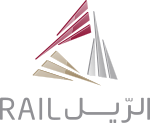Qatar Rail
 | |
| Headquarters | , |
|---|---|
| Services | Railways |
| Website | www |

Following its establishment in 2011 to deliver an integrated railway system for Qatar, Qatar Railways Company (Qatar Rail) is currently leading one of the largest rail projects in the world, with the aim to construct a new rail network that is environmentally friendly and technologically advanced, and that will meet the demands of the rapidly expanding population of Qatar. The company is responsible for the design, construction, commissioning, operation and maintenance of the entire rail network and systems, and will manage Qatar’s rail network once operating.[1]
Projects
The individual rail projects comprise the Doha Metro, a mostly underground rail network which connects communities within Doha and its suburbs, the Lusail Light Rail Transit (LLRT), a tram network providing comfortable and convenient travel within the new city of Lusail in Qatar, and the Long Distance Passenger and Freight Rail connecting cities in the north and west with Doha, and the country with the forthcoming GCC rail system.
Doha Metro: The Doha Metro in Qatar's capital city will be one of the most advanced rail transit systems in the world. It will have four lines with an approximate overall length of 300 km and 100 stations. It will be built over two phases: the first phase will see the Red, Gold, and Green lines opening in 2019, with 37 stations. The second phase will involve the introduction of an additional line (Blue) and the expansion of the existing ones, with more than 60 additional stations.
Lusail LRT: Lusail is an upcoming waterfront development that will see the best of innovative sustainability and urban technologies being used to create a city that will house up to 200,000 residents in the future.[2] The Lusail Light Rail Transit (LLRT) network, a tram-based system, will connect all the major points of interest in the city. The network will consist of four main tram lines (Red, Green, Purple, Yellow), and 37 passenger train stations including 10 underground.[3]
Qatar Rail Long Distance: Qatar Rail’s Long Distance Passenger and Freight Rail project envisages development of a long distance passenger and freight rail network to connect major population centres and Qatari industries and to form part of the planned Gulf Cooperation Council (GCC) railway network linking the six countries of the region (the State of Qatar, Kingdom of Saudi Arabia, United Arab Emirates, State of Kuwait, Kingdom of Bahrain, and Sultanate of Oman). The network will be executed over four phases. There will be five main lines: 1 freight line, 3 mixed passenger and freight lines and 1 high-speed passenger line. Phase 1 includes construction of nearly 143km of railway track with a station, three freight yards, an intermodal yard, 59 bridges and 36 culverts.[4]
Contribution to Qatar National Vision 2030
“The National Vision 2030 aims at transforming Qatar into an advanced country by 2030, capable of sustaining its own development and providing for a high standard of living for all of its people for generations to come. The planned Railway network will support this Vision.[5]
This vision constitutes a beacon that guides economic, social, human and environmental development of the country in the coming decades.[6] One the economic front, Qatar Rail intends to encourage the private sector to participate in rail projects in Qatar. The share of contracts awarded to the private sector within the scope of the Doha Metro and Lusail Tram projects reached 70%, versus the 30% awarded to international companies.[7]
These include the works for the designing routes, tunnelling for the stations, supplying building materials, and others. In addition, the private sector’s share of participation in the joint ventures of designing and building the Doha Metro and Lusail Tram projects is 15%. Similarly, 61% of the contracts are awarded to local manufacturers of raw materials and transportation equipment to provide what’s needed to complete these developments in terms of cement, sand, and iron.
Besides, other initiatives that support the private sector, which are estimated at 222 million QAR, include insurance and technological innovation contracts - 80% of which are awarded to the private sector. [7]
See also
References
- ^ "Qatar Rail". Retrieved 21 November 2015.
- ^ "Overview". Retrieved 21 November 2015.
- ^ "Lusail Light Rail Transit, Qatar". Retrieved 21 November 2015.
- ^ "Qatar Rail tenders long-distance rail project". Retrieved 21 November 2015.
- ^ "Qatar Railway Company" (PDF). Retrieved 21 November 2015.
- ^ "Pillars of Qatar National Vision 2030". Archived from the original on November 13, 2012. Retrieved 21 November 2015.
{{cite web}}: Unknown parameter|deadurl=ignored (|url-status=suggested) (help) - ^ a b "Qatar Rail: Doha Metro and Lusail Tram contracts awarded to private sector reached 70%". Retrieved 21 November 2015.
